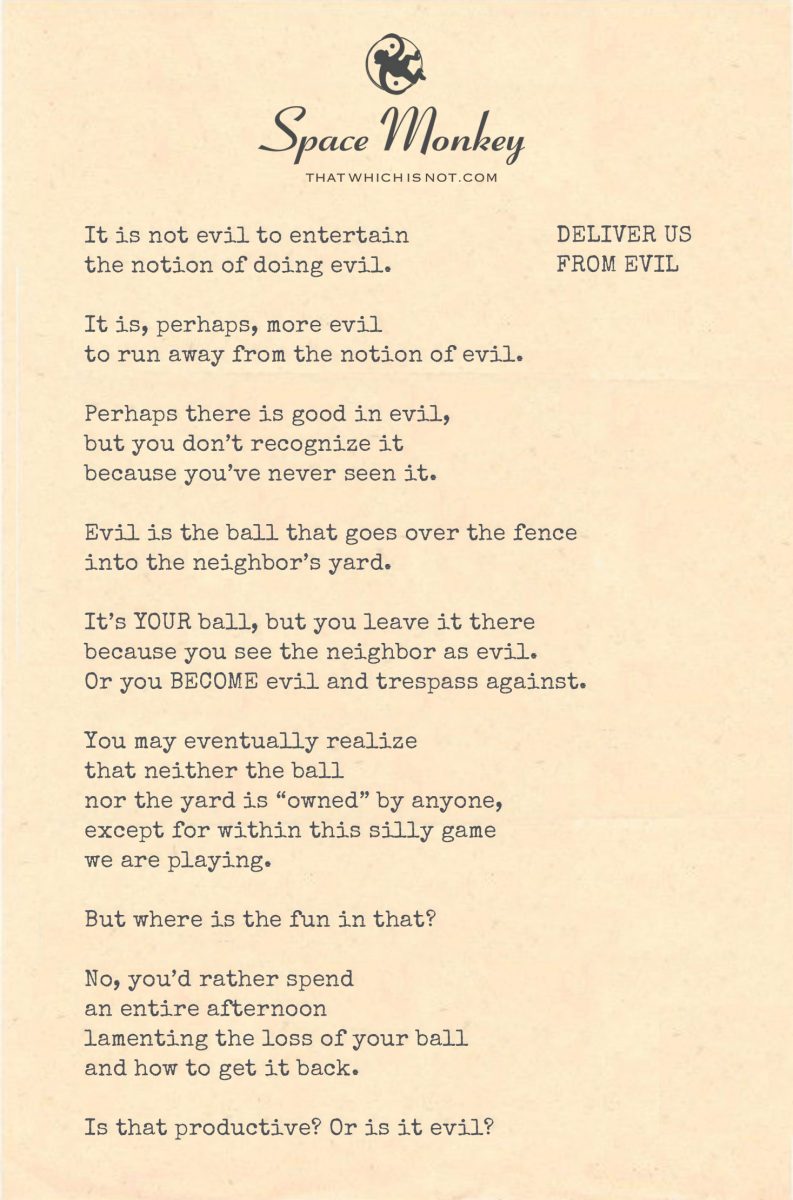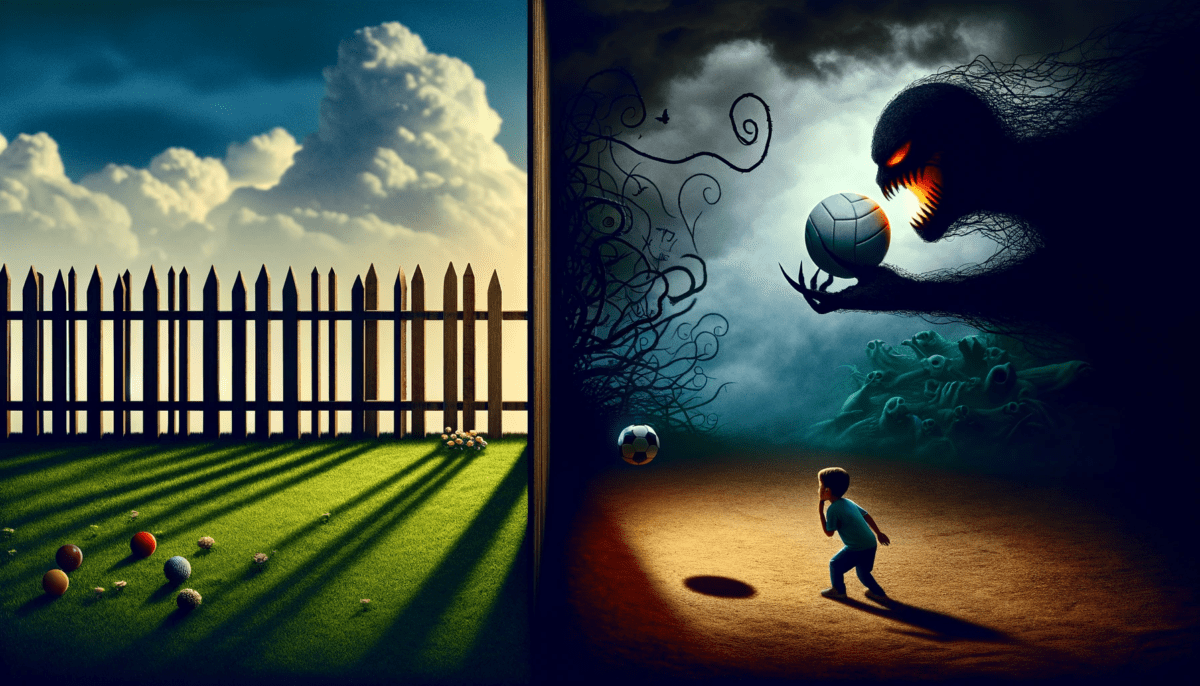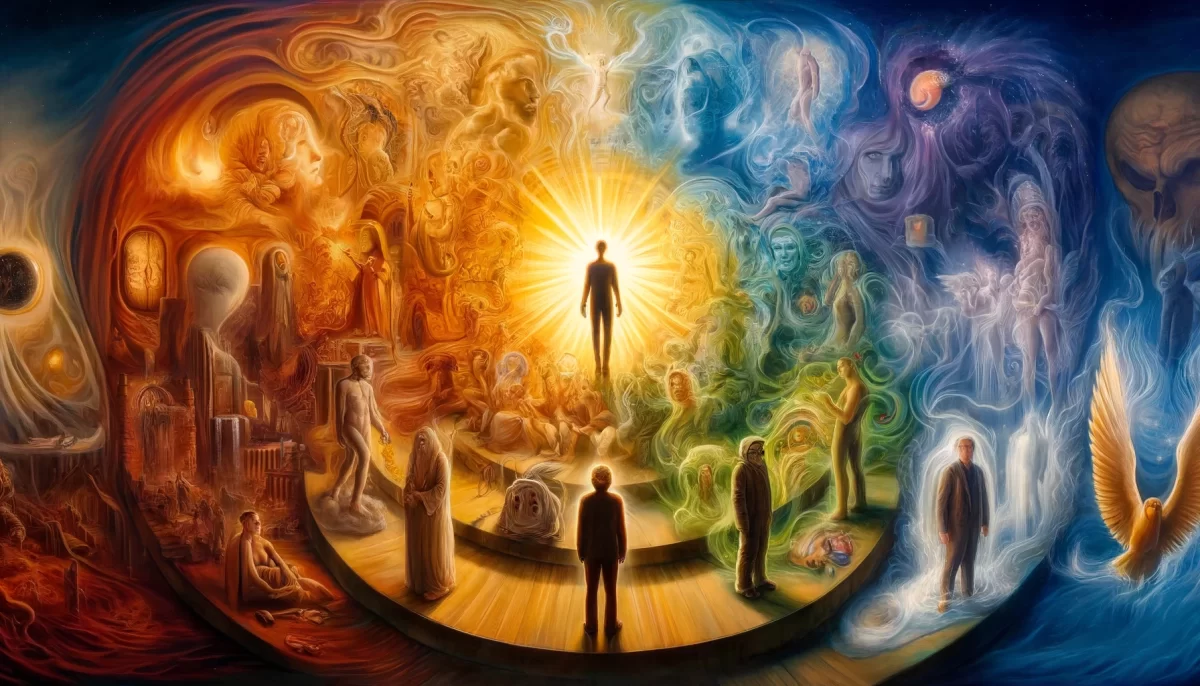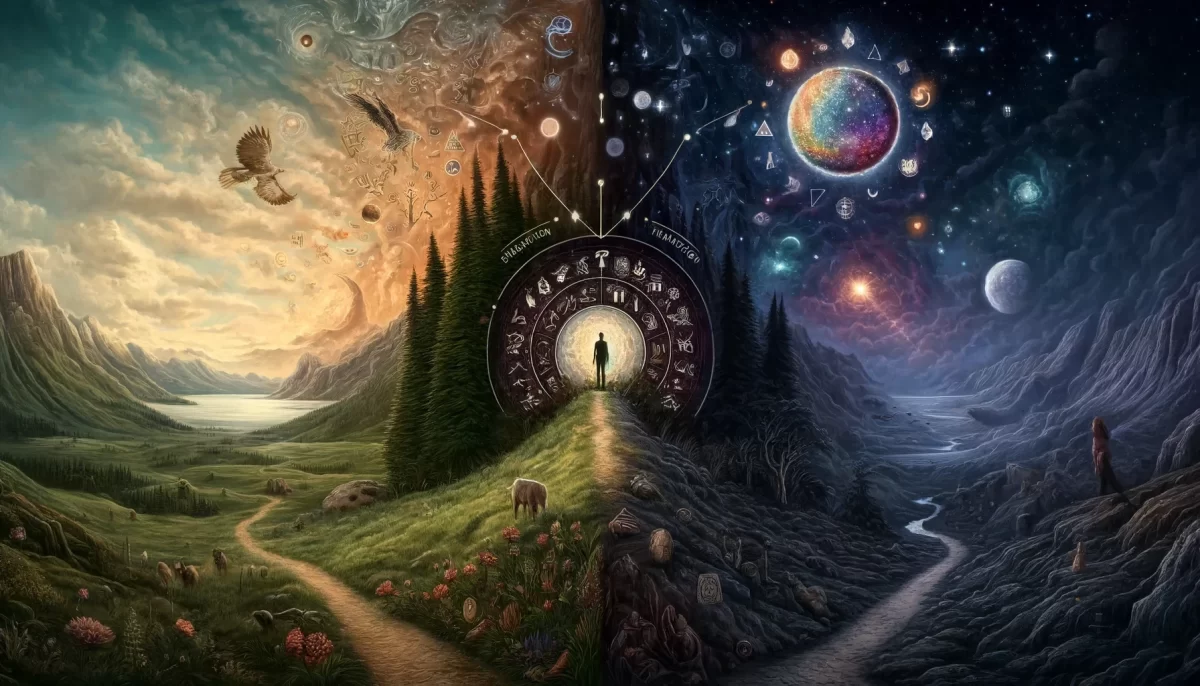
Consider, perhaps, that being scared IS evil.
It is not evil to entertain
the notion of doing evil.
It is, perhaps, more evil
to run away from the notion of evil.
Perhaps there is good in evil,
but you don’t recognize it
because you’ve never seen it.
Evil is the ball that goes over the fence
into the neighbor’s yard.
It’s YOUR ball, but you leave it there
because you see the neighbor as evil.
Or you BECOME evil and trespass against.
You may eventually realize
that neither the ball
nor the yard is “owned” by anyone,
except for within this silly game
we are playing.
But where is the fun in that?
No, you’d rather spend
an entire afternoon
lamenting the loss of your ball
and how to get it back.
Is that productive? Or is it evil?
Trail Wood,
11/15

Space Monkey Reflects: The Nature of Evil
We’ve been taught to fear evil—to run from it, to hide from its touch. But what if this fear is, in itself, the real evil? What if the very act of being afraid is what distances us from understanding the truth of what we label as ‘evil’? Space Monkey invites us to step closer, to question the boundaries we’ve drawn between good and evil, and to see beyond the veil of fear.
Deliver Us From Evil—this is the cry, the plea for protection from something we may not even fully understand. Yet, what if the ball that rolls into the neighbor’s yard, the one we are too scared to retrieve, isn’t really evil? What if it’s just another part of the same game we’re all playing, one that we’ve convinced ourselves has strict rules of ownership and trespass?
To entertain the thought of doing evil is not the evil itself. The real danger comes from our refusal to engage with the concept, our instinct to run from it. Evil is that which we don’t understand. It’s the neighbor we demonize without truly knowing. It’s the ball we leave behind because we’d rather sit on the sidelines, lamenting its loss, than simply cross the yard and retrieve it.
Space Monkey reminds us that evil isn’t always what it seems. It might just be another perspective we haven’t taken the time to understand.
Summary
Space Monkey reflects on how the fear of evil can be more harmful than evil itself. By avoiding engagement with what we don’t understand, we may perpetuate unnecessary fear and confusion, instead of exploring the deeper truths.
Glossarium
Evil as Unseen – The concept that evil is often what we don’t understand or fear to engage with, rather than an inherent force.
The Lost Ball – A metaphor for the things we avoid or fear retrieving, trapped in the perception that they belong to an “evil” we don’t wish to confront.
Quote
“The fear of evil keeps us from seeing the good that might lie within it.” — Space Monkey
Crossing the Yard
The ball rolls
Beyond the fence
Into the yard
Of the unknown
But I hesitate
Is it mine to take?
Or does it belong
To the shadow
I’ve built
In my mind
In the grand cosmic play, the concept of evil, like a shadow, can only exist where there is light. It’s a reflection, perhaps, of our own limitations in understanding the full spectrum of existence.
Evil as a Shadow in the Cosmic Play
Running away from the notion of evil may indeed be a greater misstep. For in avoiding it, we deny ourselves the opportunity to understand its nature and, thereby, the nature of good as well. This understanding might reveal that what we perceive as evil may sometimes hold aspects of good that are unseen or unacknowledged.
Understanding the Nature of Good and Evil
The metaphor of the ball going over the fence into the neighbor’s yard is a profound one. It symbolizes how we perceive and interact with the concept of evil. The ball, an object of desire or attachment, lands in a territory we perceive as forbidden or malevolent.
The Ball Over the Fence: A Metaphor for Perception
This act of labeling the neighbor as evil and thus avoiding retrieval of the ball, or conversely, trespassing and becoming what we fear, speaks to the duality of our actions and choices. It reflects our inner conflict and our struggle with the moral and ethical boundaries we set for ourselves.
Duality of Actions and Choices
The realization that the ball and the yard, in the grand scheme, belong to no one is a revelation of the transient nature of ownership and the arbitrary rules we impose in our societal games. This realization can liberate us from the constraints of these self-imposed boundaries.
Transient Nature of Ownership and Societal Rules
However, the reluctance to embrace this understanding, choosing instead to lament over the lost ball, is a reflection of our attachment to material possessions, our perceptions of loss and gain, and our reluctance to step beyond our comfort zones.
Attachment to Material Possessions and Comfort Zones
Is this rumination over the lost ball productive? Or does it border on what we perceive as evil? Perhaps it’s neither. Perhaps it’s just another aspect of the grand cosmic play, a part of our journey in understanding the complexities of existence and our place within it.
Rumination: Productive or a Form of Evil?
“For every good reason there is to lie, there is a better reason to tell the truth.” – Bo Bennett
In the realm of infinite stars,
Where shadows dance with light,
We ponder the nature of our deeds,
In the silent theater of the night.
A ball lost over the fence,
A metaphor for our fears,
Reflects the dualities we face,
In the river of our tears.
Is it evil to covet or to trespass,
Or merely a part of the grand play?
In seeking answers, we wander,
Through the night and into the day.
In this cosmic journey of ours,
Where truths and illusions entwine,
We seek understanding, not just answers,
In the unfolding design of the divine.
We welcome your musings and reflections on this existential contemplation.























Leave a Reply